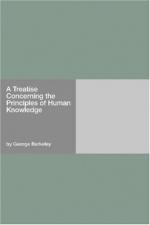8. Of generalizing [Note].—Again, the mind having observed that in the particular extensions perceived by sense there is something common and alike in all, and some other things peculiar, as this or that figure or magnitude, which distinguish them one from another; it considers apart or singles out by itself that which is common, making thereof a most abstract idea of extension, which is neither line, surface, nor solid, nor has any figure or magnitude, but is an idea entirely prescinded from all these. So likewise the mind, by leaving out of the particular colours perceived by sense that which distinguishes them one from another, and retaining that only which is common to all, makes an idea of colour in abstract which is neither red, nor blue, nor white, nor any other determinate colour. And, in like manner, by considering motion abstractedly not only from the body moved, but likewise from the figure it describes, and all particular directions and velocities, the abstract idea of motion is framed; which equally corresponds to all particular motions whatsoever that may be perceived by sense.
[Note: Vide Reid, on the Intellectual Powers of Man, Essay V, chap iii. sec. 1, edit. 1843]
9. Of compounding.—And as the mind frames to itself abstract ideas of qualities or modes, so does it, by the same precision or mental separation, attain abstract ideas of the more compounded beings which include several coexistent qualities. For example, the mind having observed that Peter, James, and John resemble each other in certain common agreements of shape and other qualities, leaves out of the complex or compounded idea it has of Peter, James, and any other particular man, that which is peculiar to each, retaining only what is common to all, and so makes an abstract idea wherein all the particulars equally partake—abstracting entirely from and cutting off all those circumstances and differences which might determine it to any particular existence. And after this manner it is said we come by the abstract idea of man, or, if you please, humanity, or human nature; wherein it is true there is included colour, because there is no man but has some colour, but then it can be neither white, nor black, nor any particular colour, because there is no one particular colour wherein all men partake. So likewise there is included stature, but then it is neither tall stature, nor low stature, nor yet middle stature, but something abstracted from all these. And so of the rest. Moreover, their being a great variety of other creatures that partake in some parts, but not all, of the complex idea of man, the mind, leaving out those parts which are peculiar to men, and retaining those only which are common to all the living creatures, frames the idea of animal, which abstracts not only from all particular men, but also all birds, beasts, fishes, and insects. The constituent




